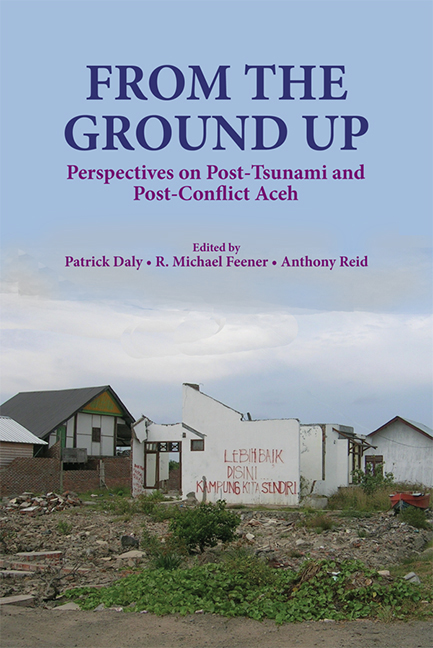Book contents
- Frontmatter
- Contents
- Preface
- List of Figures and Tables
- The Contributors
- Glossary and Abbreviations
- Introduction: Unpacking the Challenges of Post-2004 Aceh
- 1 The Sunda Megathrust: Past, Present and Future
- Part I Reconstruction Efforts
- 2 Disaster Recovery: An International Humanitarian Challenge?
- 3 Linking Relief, Rehabilitation and Development (LRRD) to Social Protection: Lessons from the Early Tsunami Response in Aceh
- 4 Cultural Heritage and Community Recovery in Post-Tsunami Aceh
- 5 Managing Post-Disaster Reconstruction Finance: International Experience in Public Finance Management
- 6 Between Custom and Law: Protecting the Property Rights of Women after the Tsunami in Aceh
- 7 Factors Determining the Movements of Internally Displaced Persons (IDPs) in Aceh
- 8 Aceh's Forests as an Asset for Reconstruction?
- Part II Conflict Resolution
- Index
2 - Disaster Recovery: An International Humanitarian Challenge?
from Part I - Reconstruction Efforts
Published online by Cambridge University Press: 21 October 2015
- Frontmatter
- Contents
- Preface
- List of Figures and Tables
- The Contributors
- Glossary and Abbreviations
- Introduction: Unpacking the Challenges of Post-2004 Aceh
- 1 The Sunda Megathrust: Past, Present and Future
- Part I Reconstruction Efforts
- 2 Disaster Recovery: An International Humanitarian Challenge?
- 3 Linking Relief, Rehabilitation and Development (LRRD) to Social Protection: Lessons from the Early Tsunami Response in Aceh
- 4 Cultural Heritage and Community Recovery in Post-Tsunami Aceh
- 5 Managing Post-Disaster Reconstruction Finance: International Experience in Public Finance Management
- 6 Between Custom and Law: Protecting the Property Rights of Women after the Tsunami in Aceh
- 7 Factors Determining the Movements of Internally Displaced Persons (IDPs) in Aceh
- 8 Aceh's Forests as an Asset for Reconstruction?
- Part II Conflict Resolution
- Index
Summary
DISASTER RECOVERY: DEFINITIONS, DESCRIPTIONS AND CONSTRAINTS
Natural disasters produce long-term and complex impacts on survivors' livelihoods, on their physical, social and political infrastructure, and the environment. In almost all cases, recovery operations appear almost immediately following a natural disaster. After being initially absorbed with helping survivors locate loved ones and organizing emergency aid, recovery efforts rapidly turn to longer-term concerns such as housing, re-opening schools and re-establishing income generation and livelihood activities. As is argued by other authors in this volume, to be successful, recovery activities must be rooted firmly in local and national priorities, processes and capacities. This, however, has become increasingly complicated because of the large-scale internationalization of disaster response efforts.
In industrialized countries, natural disaster response is typically managed (“owned”) by the affected states, as can be seen in the US response to Katrina, the Japanese response to the Kobe earthquake, and the more recent Chinese response to the Sichuan earthquake. Disaster-affected persons are the primary actors in their own recovery, funded and led in large part by national and regional authorities. Respect for such “ownership” is a principle of international humanitarian aid, as reflected in the Sphere Project standards, the Red Cross Code of Conduct and the Good Humanitarian Donorship initiative.
In “non-industrial” nations, and other instances where the scope of the disaster exceeds local capacities to respond effectively, a wide range of humanitarian actors have increasingly become involved. This is clearly illustrated by the intensive response to the 2004 Indian Ocean Tsunami, especially in Indonesia and Sri Lanka. A dramatic increase in the funding entrusted to international humanitarian aid actors has put pressure on them to assume more prominent roles in post-disaster settings (see section below on funding). However, they face major constraints and challenges in designing and implementing recovery programmes. While there are many cases of “good practice”, in this chapter I will be focusing more on the appropriateness and effectiveness of humanitarian aid actors in the face of such recovery challenges and constraints. In doing so, I concentrate more on the shortcomings of international organizations.
- Type
- Chapter
- Information
- From the Ground UpPerspectives on Post-Tsunami and Post-Conflict Aceh, pp. 25 - 39Publisher: ISEAS–Yusof Ishak InstitutePrint publication year: 2012



